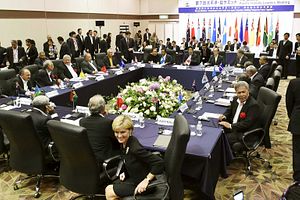The Pacific Islands region, no longer remote from the global centers of power, is experiencing new forms of geopolitical competition. Australia and New Zealand have long dominated the region, providing an effective security guarantee and most of the region’s trade and diplomatic links and aid. The influence of the region’s larger metropolitan powers – the United States and France – has prevailed in their own territories. This is changing with the rise of China and with the efforts of island states to diversify their international partnerships.
Aid plays an outsized role in the relationships of external powers with Pacific Island nations. The high dependency of many smaller island nations on aid and the limited capacity of governments in the region to deliver services to their people makes aid, more so than trade, investment, or military ties, a key means of exercising influence. The exceptions to this rule are the two largest island nations, Papua New Guinea and Fiji, which are not as dependent on aid and have both diversified their foreign relationships successfully over the last decade. Smaller nations have been vulnerable to approaches from countries such as Turkey, the United Arab Emirates, and Russia, which secured support for their UN or other international candidacies or positions with relatively small aid contributions that were not sustained much past the date of the relevant vote.
Chinese aid was originally mostly delivered to Pacific Island states to secure their commitment to the “one China” policy when a more assertive Taiwan was pursuing diplomatic recognition from those states. An era of checkbook diplomacy between China and Taiwan persisted until the election of the Ma government in Taipei, which called a diplomatic truce in 2008 (meaning neither Beijing nor Taipei would court each other’s diplomatic partners). China’s interests in the region have grown remarkably from this point.

































